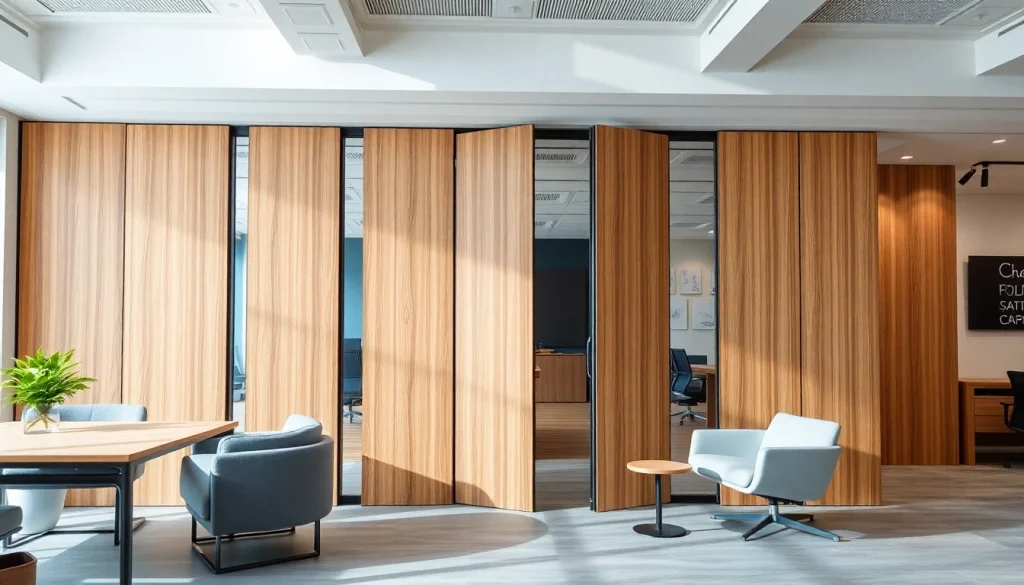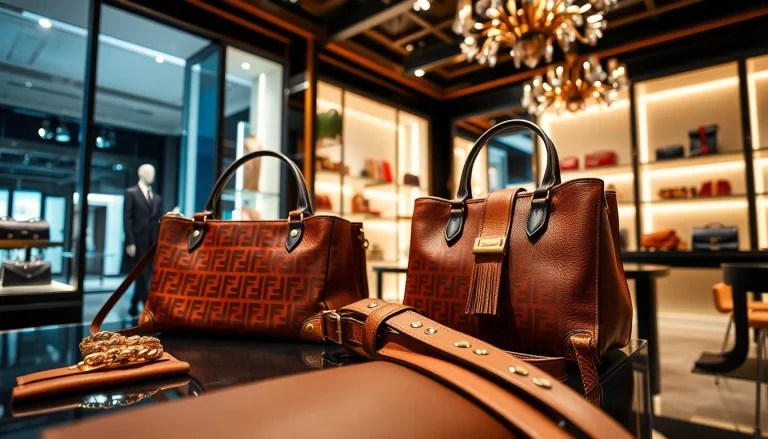
Understanding Folding Partition Walls
What is a Folding Partition Wall?
A folding partition wall is a versatile space management solution designed to create temporary or permanent divisions within a given area, allowing for fluid reconfiguration of spaces as needed. Often used in commercial and residential settings, these walls offer the ability to alter room sizes, provide privacy, and enhance functionality without the extensive requirements of traditional construction. Comprised of lightweight materials, folding partition walls can be easily maneuvered and stored when not needed.
Essentially, a folding partition wall operates on a track system, enabling it to slide open or closed smoothly, providing options for both retractable installations and fixed configurations. The flexibility they offer is pivotal for dynamic environments such as offices, conference rooms, and hospitality venues, where space requirements frequently change.
Types of Folding Partition Walls
Folding partition walls are available in various designs and functionalities, accommodating diverse applications:
- Accordion Walls: These walls consist of multiple panels that fold together, similar to an accordion. They are particularly effective for creating temporary spaces and are commonly used in schools and community centers.
- Bi-Fold Walls: Made up of two large panels that pivot on hinged edges, bi-fold walls provide a balance between wide openings and ease of use. These are perfect for residential settings where space needs to be versatile.
- Multi-Fold Walls: Comprising three or more panels, these walls allow for significant openings while still being compact when folded away. They are suitable for larger rooms or venues that often host events.
- Glass Partition Walls: For those looking to maintain visibility while creating separate spaces, glass folding partitions offer an aesthetic solution that enhances natural light and design appeal.
- Operable Walls: A more advanced solution featuring sound-insulating properties, operable walls are ideal for commercial spaces where acoustics play a key role in maintaining privacy and reducing noise disturbance.
Benefits of Using Folding Partition Walls
Folding partition walls come with a myriad of advantages that make them an appealing choice for space management:
- Space Optimization: These walls allow users to maximize space based on immediate needs, creating separate areas for different activities without the need for permanent construction.
- Cost-Effectiveness: Folding partition walls typically require less upfront investment than traditional construction, reducing labor and material costs while enhancing functionality.
- Quick Installation: With a straightforward installation process, folding partition walls can be set up quickly, causing minimal disruption to existing operations.
- Customizability: Various materials, finishes, and designs can be selected, allowing users to tailor the partition walls to match the aesthetics of their spaces.
- Acoustic Control: Certain models feature soundproofing capabilities, providing privacy and focus in environments such as offices and therapy rooms.
Applications of Folding Partition Walls
Folding Partition Walls for Commercial Spaces
In the commercial sector, folding partition walls are transformative for managing fluctuating needs. Office environments benefit from the ability to convert open-plan layouts into focused meeting spaces or collaborative work areas. For instance, a large conference room can be easily partitioned into smaller sections for breakout sessions during corporate events.
Additionally, in restaurants and event venues, folding partitions can create intimate dining spaces or large banquet halls, accommodating diverse group sizes. A popular implementation is using glass folding partitions that enhance the dining experience while maintaining an open ambiance.
Folding Partition Walls in Residential Settings
At home, folding partition walls support the versatility necessary for modern living. They can transform large living areas into cozy reading nooks or separate play areas for children from adult spaces. With designs ranging from trendy to classic, residential partition walls can contribute to the aesthetic appeal of a home while maximizing its functional potential.
Moreover, homeowners often use these walls to create temporary guest spaces for visitors, providing both privacy and comfort without the need for expansive renovations.
Innovative Uses of Folding Partition Walls in Event Management
Event management professionals often rely on folding partition walls to create dynamic environments. Whether organizing trade shows, exhibitions, or corporate events, the ability to quickly reconfigure spaces is crucial. For example, large exhibition halls can be divided into smaller configurations to suit various exhibitors and presentations.
Furthermore, using high-quality acoustic folding walls can help manage sound levels in busy venues, ensuring that activities taking place simultaneously do not disturb one another. This aspect is particularly beneficial in scenarios where audio-visual presentations are involved.
Key Features to Look for in Folding Partition Walls
Materials and Construction Standards
When selecting folding partition walls, the materials used in their construction are fundamental to their durability and effectiveness. High-quality partitions are often made from materials like aluminum, wood, or composite surfaces that ensure robustness while remaining lightweight. Additionally, it is crucial to look for walls constructed to industry standards for safety and reliability.
Materials also play a role in aesthetics. For instance, walls covered in decorative laminates or eco-friendly finishes can enhance the visual appeal while promoting sustainability.
Acoustic Performance and Privacy Features
The soundproofing capacity of folding partition walls can vary widely between models. It’s essential to evaluate the Sound Transmission Class (STC) rating, which indicates how well a wall can block sound. High-STC-rated walls are ideal for environments requiring confidentiality, such as law offices, medical offices, or counseling spaces.
Privacy features also extend to the hardware used in the installation, with options for locks and seals that prevent sound leakage when walls are closed.
Design Flexibility and Aesthetic Options
Folding partition walls come in a range of aesthetic options, allowing them to seamlessly integrate into various interior designs. Custom finishes, colors, and lighting options can be specified to complement existing decor or promote a brand’s identity in commercial spaces.
Additionally, the design of the track system can also be customized for ease of use while being visually appealing, ensuring that the partitions look as good as they perform.
Installation Considerations for Folding Partition Walls
Preparation and Planning for Installation
Before embarking on the installation of folding partition walls, careful planning and preparation are vital to ensure a successful outcome. The first step is to assess the space where the wall will be installed and determine the desired configuration. Measuring the area accurately will inform decisions regarding wall height, width, and the number of panels required.
Additionally, consulting with experts in acoustics and design may provide insights on optimal layout and materials for achieving the best performance and appearance.
Step-by-Step Installation Process
The installation of folding partition walls involves several key steps:
- Gather Tools and Materials: Essential tools such as drills, level, and measuring tapes should be on hand. Materials specific to the chosen wall type, such as tracks, panels, and hardware, must be prepared in advance.
- Install the Track System: The first installation step involves mounting the track system, following manufacturer guidelines to ensure it is level and secure.
- Attach Wall Panels: Once the track is installed, panels can be hung according to the system’s design, ensuring that each panel operates smoothly along the track.
- Final Adjustments: Adjust all panels for alignment and ease of use, making any necessary tweaks to ensure a fluid operation.
- Test Functionality: Open and close the wall several times to ensure everything operates correctly and make adjustments as needed.
Maintenance Tips for Longevity and Performance
To keep folding partition walls functioning optimally over time, regular maintenance is essential. Key maintenance tips include:
- Cleaning: Regularly dust and clean the panels and tracks to prevent build-up, ensuring smooth operation.
- Inspections: Periodically inspect the track system and hardware for wear and tear. Tighten loose components and lubricate moving parts to maintain performance.
- Prompt Repairs: Address any damages immediately to prevent further issues and ensure the continued effectiveness of the partition.
Comparing Folding Partition Walls with Other Dividers
Folding Partition Walls vs. Fixed Walls
When comparing folding partition walls to fixed walls, the primary distinction lies in flexibility. Fixed walls are permanent solutions that can require considerable time and investment to alter. In contrast, folding partition walls can be quickly adapted to changing space requirements, allowing for dynamic use of areas without extensive renovations.
Moreover, fixed walls often do not offer the same aesthetic flexibility or acoustic properties that high-quality folding partitions provide, making them less versatile in certain environments.
Folding Partition Walls vs. Sliding Panels
Sliding panels offer another option for space division but typically lack the same level of completeness in coverage when compared to folding partition walls. Sliding panels may operate on a simple track and be suited for smaller spaces, while folding partitions can achieve full separations and better aesthetic integration.
In environments where sound privacy is paramount, folding partition walls, particularly those with enhanced acoustic properties, may provide superior performance compared to sliding panels.
Choosing the Right Divider for Your Space Needs
Selecting the right divider for a given space involves assessing specific needs. Considerations should include:
- Functionality: Assess how the space will be used and the need for flexibility.
- Acoustic Needs: Determine the importance of sound privacy and select accordingly.
- Aesthetics: Consider how the partition will impact the overall look of the space.
- Budget: Evaluate the cost implications of different wall types and their installation requirements.
Ultimately, opting for a Folding Partition Wall can provide the unique space optimization advantages that more static solutions are unable to offer.






